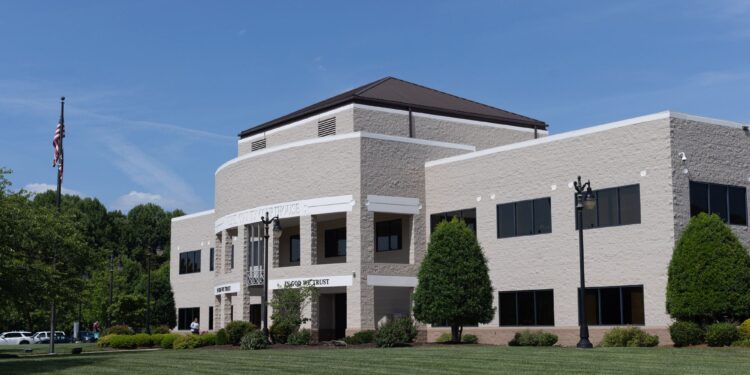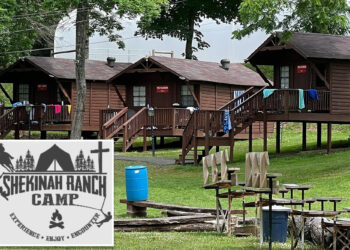Wilkes County, North Carolina, has been hit hard by the opioid epidemic, but local officials have been open to approaches for making the crisis less deadly. They recently embraced a new strategy: a recovery court offering services, treatment and the potential to avoid prison. But, just as it was preparing to launch, the Justice Department pulled its funding this spring, stalling the effort before a single case could be heard.
The planned court is a collaboration between a local nonprofit called Project Lazarus, the chief judge, the district attorney and a group of defense attorneys. The court was intended to support recovery and connect people with services, like housing or insurance, in criminal cases tied to substance use. Recovery courts like this one aim to reduce participants’ substance use, recidivism and the burden repeated cases can have on the courts.
The first four years of expenses were going to be covered by a $900,000 Department of Justice grant to Project Lazarus, funding that was difficult to find.
However, in April, before the court could open, its grant was among hundreds abruptly cancelled under President Donald Trump. Project Lazarus’ notice from the Justice Department said the award “no longer effectuates the program goals or agency priorities,” which now focus on direct law enforcement assistence, combatting violent crime, protecting children and supporting victims of trafficking and sexual assault.
Fred Wells Brason II, the president and CEO of Project Lazarus, said he doesn’t know why the grant was terminated and has appealed the decision. Justice Department officials did not respond to The Marshall Project’s request for comment.
It’s not clear how halting a program initiated by those working closely with law enforcement, in a county where Trump won by nearly 60 percentage points last November, aligns with the administration’s public safety policies and messaging. Weeks before the administration terminated the Justice Department grants, it extended a public health emergency declaration about opioid deaths.
Amy Solomon, a senior fellow at the Council on Criminal Justice who analyzed the terminated Justice Department grants, said she couldn’t explain why the Wilkes County grant would be cut. Traditionally, a grant would only be revoked in the case of some kind of mismanagement and only after a process of engagement with the recipient. “It’s a very unusual course of action,” Solomon said.
Rather than slicing off entire funding programs, the late-April cuts targeted individual grants. Other recipients through the same initiative that funded the Wilkes County effort escaped with their grants intact. Solomon, a former assistant attorney general who headed the Office of Justice Programs, which oversees most of the Justice Department’s grantmaking, said a new administration will often make changes to grant programs, but making piecemeal cuts across programs, or ending funding mid-stream, is unusual.
In total, more than $88 million dollars in initial grant awards for programs dealing with substance use and mental health were cut, the council’s analysis found.
Wilkes County, home to about 66,000 people in the northwestern corner of the state, is known for stock car racing and an Americana music festival. It’s also known for the decline of its furniture industry and the loss of the headquarters of home-improvement giant Lowe’s. In the 2000s, the county had one of the highest opioid overdose rates in the country, but later succeeded in reducing overdose deaths.
The grant for the county’s court would have paid for hiring a court coordinator, as well as peer support specialists to work with an estimated 150 participants per year. The specialists, who often have experienced both substance use and the justice system first-hand, would not only help participants navigate the court process, but also connect them to housing, transportation and treatment.
Ericka Minton, a peer support specialist at Project Lazarus, carries a cooler full of Vivitrol, a prescription drug used to treat alcohol and opioid dependency, to the county jail.
Ericka Minton is a peer support specialist at Project Lazarus, the kind of role that would have worked specifically with court participants.
She helps incarcerated people get in touch with their attorneys and does intake for the county jail’s drug treatment program. She gets people into detox programs and then longer-term treatment when they’re released. She provides applications for transitional housing, since many people lose their housing while locked up. She helps people apply for food stamps. If past convictions have made them ineligible, she’ll help them access food pantries. If someone needs a ride to these services, she does that too.
“So it’s like pretty much their whole life, whatever they’re trying to do, we support them in doing,” Minton said. This support and working with participants to come up with a plan for recovery where they have agency is central to the stalled court.
Minton with a vending machine that dispenses free Narcan, at the Wilkes County Jail in North Carolina.
Under the court’s plan, the judge and court team would review eligible cases after a conviction. To qualify to participate in the court, defendants could only face charges that are non-violent and have some connection with substance use, but can’t be related to selling drugs. The process, which lasts about a year, requires two court dates a month, regular drug tests and check-ins with probation officers. If a participant doesn’t meet the program requirements, they will face the original sentence, often incarceration.
A failed drug test would not mean immediate expulsion from the program, but the court team still needs to decide at what point infractions would lead to incremental punishments, such as weekends in jail, or removal from the program. Wilkes County officials hoped to work out these details, but that is on hold due to the funding cut.
North Wilkesboro is the county seat of Wilkes County, North Carolina, where Project Lazarus worked with the chief judge, district attorney and defense attorneys on plans for a recovery court.
North Carolina’s legislature created the recovery court program in the mid-1990s. There are now dozens of such courts across the state. Paul Newby, chief justice of North Carolina’s Supreme Court, heralded the success of these courts in a medical journal article. “Can the courts help justice-involved individuals recover from these problems?,” Newby wrote. “The answer is ‘yes.’” Newby also encouraged the creation of a court in Wilkes County.
The state once paid for recovery courts in some counties; but, in 2011, facing a statewide budget shortfall, the legislature ended the funding. The lack of state funding leaves counties to fill in the gap, often through federal grants. They also rely on grants from local nonprofits and foundations, taxes on alcohol sales and donations. This system relies heavily on local governments to piece together funding for new justice programs, explained Marvin Swartz, a practicing psychiatrist and researcher at Duke University.
Swartz and other researchers surveyed North Carolina recovery court professionals and found many had concerns about their budgets. “Public funding for treatment courts has been unstable and insufficient,” they wrote in a 2021 journal article.
“To me, it would be far better if we had an organized system of funding that could assure that you have a level playing field across the state,” Swartz said.
Allison Gilbert, a co-author of the 2021 article and associate professor at Duke, said that, even when a county can create a court, the quality, or mere existence, of treatment programs, can vary widely. On top of that, courts can do little to create housing or overcome unstable transportation, things people need for success.
Brason said he has started reaching out to find other funders. However, replacing the federal grant will be difficult. “Newby told me to do it, and they said, but guess what, you don’t get any money,” Chief District Court Judge Robert Crumpton said during a county meeting in January. “But for Fred finding this, I don’t know how we would have started it up.”
The federal government has long offered local jurisdictions a combination of money and expertise useful for confronting difficult problems like opioid use, even as the actual delivery of services has shifted to non-governmental organizations, said Scott Burris, the director at Temple University’s Center for Public Health Law Research.
Burris has written about a “whole of government” response to opioid use, which he defines as the need for different levels of government, and different agencies at the same level, to share resources and cooperate in order to have the strongest solution to a problem. Burris says they must also contend with three different, sometimes conflicting, approaches to addressing drug use: treating it as a crime, treating it as a public health issue and harm reduction. In his view, funding is a crucial mechanism for bringing people out of ideological and agency silos.
Disrupting funding can have dire consequences. “This is all about budget-cutting. The only logic here is if you cut things with a chainsaw you make big gross cuts and that’s that,” said Burris. “It’s monstrous. And it will kill people.”
The money for Justice Department grants like the one for the Wilkes County court originates with Congress, which could take some action to intervene. At the end of April, Sen. Cory Booker, D-NJ, sent a letter, co-signed by other Senate Democrats, asking the Justice Department for more information about the cuts and demanding that the grants be restored. U.S. Rep. Virginia Foxx, a Republican whose district includes Wilkes County, has broadly supported spending cuts in the federal government, and did not respond to a Marshall Project question about the slashed Justice Department grants.
While Project Lazarus’ appeal of the grant revocation winds its way through the Justice Department, Wilkes County continues to look at other pathways for those with low-level offenses to move from the justice system into supportive services.
In July, the consortium behind the recovery court, local police and the sheriff are starting a law enforcement-assisted diversion program, where officers have the option to refer someone to Project Lazarus’ peer support rather than arresting or charging them.
Project Lazarus has always looked for ways to fill gaps in the community’s response to substance use, Brason said. This has meant a long process of overcoming bias and stigma and building the collaboration for the diversion program or recovery court.
Minton, the peer support specialist, knows the importance of the connections those programs would offer from her own experience with the justice system. In the past, struggles with addiction and mental health led her to spend time in jail and on probation. She now offers the kind of help she wished she had then, and not just reminders to keep appointments and give clean drug screens. “No one ever offered me any kind of community support, resources, anything like that,” she said.



























